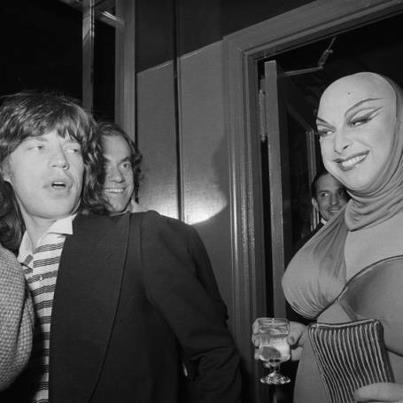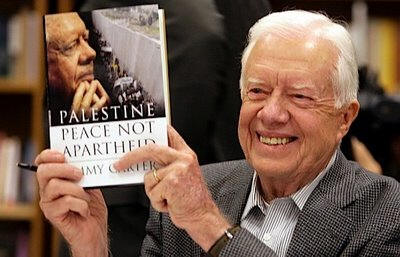The beauty of being born again is that you get to wipe the slate clean. Its ingenious, very much in the spirit that de Toqueville described America on his visit early in the nineteenth-centiry as the land of constant personal re-invention as the need arises. To go from signing off on all the killings in Central America among other mis-deeds to the Nobel Prize for peace is a tour-de-force performance. To pull the context into more biting territory of Sinclair Lewis, you could say Carer is a deluxe version of Elemer Gantry. The scriptures have served him well, vesting him with a sort of authoritarianism that confinement of the Arabs and Jews with the notion of madness linked to religion. Effectively, Carter is an enabler, a repressive force that keeps the actors in the box, while assuming an almost feminine complicity, a support role one associates with misogynist tropes from Hollywood burnishing his image as idealistic if somewhat naive. Clever.
Or, Carter has a recurring, mild, but chronic form of Jerusalem syndrome that yanks the former President back to that idyllic era when priests and holy men enjoyed absolute power and every second in one’s life was filled with ceremony and ritual, visits to the poor and needy, like Carter’s excursions to East Jerusalem. Here, time is an organized happiness with no time left for terrorism, rebellion, and if boredom got the upper hand, transgression was diluted into an authoritarian synthesis, again by use of suppression and punishment. As Michel Foucault said, “if, on the contrary, religion loosens its hold but maintains the ideal forms of remorse of conscience, of spiritual mortification, it leads directly to madness;in which the heart of man is abandoned to its own anxiety, in which the passions surrender time to unconcern or to repetition in which, finally, madness can function freely. The key link here is Carter with the ratcheting up of anxiety…

—What really bothers Carter about this administration is that “Regardless of the costs, there are determined efforts by top U.S. leaders to exert American imperial dominance throughout the world.”
Carter may come across today as a sort of benign and liberal old sage, but these statements are in flat contradiction to his practice as the 39th president from 1977-1981. When asked if the U.S. should rebuild Vietnam, a country it destroyed at a cost of three million Vietnamese lives and 58,000 U.S., his glib response was, “Well, the destruction was mutual.”—Read More:http://www.counterpunch.org/2006/01/18/democrats-and-other-false-friends/
Chomsky:If the Nuremberg laws were applied, then every post-war American president would have been hanged. By violation of the Nuremberg laws I mean the same kind of crimes for which people were hanged in Nuremberg. And Nuremberg means Nuremberg and Tokyo. So first of all you’ve got to think back as to what people were hanged for at Nuremberg and Tokyo. And once you think back, the question doesn’t even require a moment’s waste of time. For example, one general at the Tokyo trials, which were the worst, General Yamashita, was hanged on the grounds that troops in the Philippines, which were technically under his command (though it was so late in the war that he had no contact with them — it was the very end of the war and there were some troops running around the Philippines who he had no contact with), had carried out atrocities, so he was hanged. Well, try that one out and you’ve already wiped out everybody. …

—The Shah Pahlevi regime, which had come to power in Iran in a CIA-sponsored coup in 1953, was renowned for the murderous brutality of its secret police. Carter visited the Shah in 1979 and praised him for his “progressive administration” at a time when the Shah’s military was gunning down thousands of unarmed demonstrators.
In response to the Shah’s fall in the 1979 revolution, Carter, in his 1980 State of the Union address, set forth his Carter Doctrine: “Let our position be absolutely clear: An attempt by any outside force to gain control of the Persian Gulf region will be regarded as an assault on the vital interests of the United States of America, and such an assault will be repelled by any means necessary, including military force.”—Read More:http://www.counterpunch.org/2006/01/18/democrats-and-other-false-friends/
…Carter was the least violent of American presidents but he did things which I think would certainly fall under Nuremberg provisions. As the Indonesian atrocities increased to a level of really near-genocide, the U.S. aid under Carter increased. It reached a peak in 1978 as the atrocities peaked. So we took care of Carter, even forgetting other things….Read More:http://www.chomsky.info/talks/1990—-.htm
ADDENDUM:

—Another thing Professor Dershowitz revealed tells us much about former President Jimmy Carter. It seems that when Carter appeared at Brandeis to plug his book Palestine: Peace, Not Apartheid, he pledged to answer any questions that students e-mailed him afterward. Many took him up on the offer, and Carter did answer every question… except one.
That one was this: Did you advise Yasser Arafat to reject the peace offer Israel made at Camp David, at the end of Clinton’s term? According to Professor Dershowitz, some 15 students e-mailed that question, and they were the only students not to be answered.
Hmm. —Read More:http://www.freerepublic.com/focus/f-news/1936686/posts
(see link at end)…Chomsky: One must not forget that this country was founded by religious fanatics. Since Jimmy Carter, religious fundamentalists play a major role in elections. He was the first president who made a point of exhibiting himself as a born again Christian. That sparked a little light in the minds of political campaign managers: Pretend to be a religious fanatic and you can pick up a third of the vote right away. Nobody asked whether Lyndon Johnson went to church every day. Bill Clinton is probably about as religious as I am, meaning zero, but his managers made a point of making sure that every Sunday morning he was in the Baptist church singing hymns. Read More:http://www.spiegel.de/international/world/interview-with-noam-chomsky-the-united-states-has-essentially-a-one-party-system-a-583454.html
(see link at end)…Although some critics have compared Michael Moore to Charlie Chaplin, I associate his moralism with the movies of Frank Capra, especially “It’s a Wonderful Life”. With the banks in his gun-sight, Moore evokes the struggle in this movie between an idealistic banker James Stewart and the evil banker Lionel Barrymore. There is a strong sense that Moore’s problem with capitalism is not that it is based on a class system per se but that it has broken a social contract established during the New Deal. His enemies are of course the Republicans but also the Democrats who abandoned FDR’s vision, starting with Jimmy Carter who is seen delivering a speech in 1979 with these words:
In a nation that was proud of hard work, strong families, close-knit communities, and our faith in God, too many of us now tend to worship self-indulgence and consumption. Human identity is no longer defined by what one does, but by what one owns. But we’ve discovered that owning things and consuming things does not satisfy our longing for meaning. We’ve learned that pili
p material goods cannot fill the emptiness of lives which have no confidence or purpose.Moore understands that the business about “piling up material goods” was a green light for American corporations to cut wages. What better way to get workers to become more spiritual than to reduce their earning power, after all.Read More:http://louisproyect.wordpress.com/2009/09/25/capitalism-a-love-story/
Michel Foucault (Madness and Civilization)…In the dialectic of insanity where reason hides without abolishing itself, religion constitutes the concrete form of what cannot go mad; it bears what is invincible in reason, it bears what subsists beneath madness as quasi-nature and around it as the constant solicitation of a milieu “where, during lucid intervals, or the state of convalescence, the patient might enjoy the society of those who were of similar habits and opinions.” Religion safeguards the old secret of reason in the presence of madness, thus making closer, more immediate, the constraint that was already rampant in classical confinement. There, the religious and moral milieu was imposed from without, in such a way that madness was controlled, not cured. At the Retreat, religion was part of the movement which indicated in spite of everything the presence of reason in madness, and which led from insanity to health. Religious segregation has a very precise meaning: it does not attempt to preserve the sufferers from the profane presence of non-Quakers, but to place the insane individual within a moral element where he will be in debate with himself and his surroundings: to constitute for him a milieu where, far from being protected, he will be kept in a perpetual anxiety, ceaselessly threatened by Law and Transgression.





 COMMENTS
COMMENTS